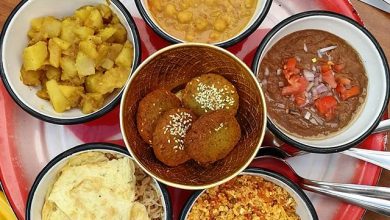A Culinary Journey: Traditional Foods Served at Bahrain’s Religious Events
Bahrain's Religious Events

Bahrain, a tiny island u.S.A. Within the Arabian Gulf, is satisfied with its wealthy cultural legacy, which has been common via the use of numerous affects and centuries’ nicely properly well worth of facts. The meals customs of Bahrain are one element of the us of a’s way of life which might be fantastically important, especially on holy days and fairs.
1. Ramadan: A Month of Fasting and Feasting
The ninth month of the Islamic lunar calendar, Ramadan, is fantastically amazing to Muslims anywhere inside the global. It’s a month of network building, introspection, prayer, and fasting. When Ramadan arrives in Bahrain, the food scene changes as families and organizations get together for iftar, or the nightly meal, to break their fast.
Bahrain’s Customary Ramadan Foods:
Qubooli: A fragrant rice meal topped with fried onions and almonds that is ready with red meat, lentils, and a mixture of fragrant spices.
Ma’amoul: Date-crammed pastries baked with wheat or semolina dough, generally furnished as a sweet deal with earlier than iftar.
Jareesh: A giant porridge made with more wheat, meat, and spices that is generally fed on at suhoor, the meal that takes place earlier than sunrise.
2. Eid al-Fitr: Celebrating the End of Ramadan
The day of breaking the short, referred to as Eid al-Fitr, commemorates the stop of Ramadan and is broadly celebrated with ingesting and satisfied celebrations. Families in Bahrain get collectively to have amusing this momentous event via sharing unique meals and trading objects.

Bahrain’s Customary Eid al-Fitr Foods:
Maqluba is a delectable rice, meat, and vegetable dish this is normally served as the main course of Eid celebrations.
Luqaimat: Deep-fried dumplings that represent prosperity and splendor, generally sopping moist in honey or date syrup.
Gahwa is a traditional Arabic espresso made with cardamom and served in little glasses. The dates are introduced as a sign of friendship.
3. Ashura: Commemorating a Sacred Day
For Shia Muslims, Ashura is a incredible sized non-secular vacation that honors the martyrdom of Imam Hussein, the Prophet Muhammad’s grandson. Ashura is well known in Bahrain with processions, prayers, and public conferences. The giving of food to the underprivileged is a traditional a part of the party.
Bahrain’s Customary Ashura Foods:
Harees: A delicious porridge cooked until creamy and served with sugar and ghee, together with wheat, meat, and spices.
Sambusa: During Ashura processions, deep-fried pastries full of spiced meat or vegetables are commonly given out as a kind gesture.
Halwa Showaiter: Usually eaten as a dessert in the course of Ashura celebrations, this wealthy, candy delicacy is made with sugar, cornstarch, and saffron or rosewater.
4. Muharram: Commemorating the Islamic New Year
The Islamic lunar calendar starts offevolved offevolved with Muharram, a month dedicated to reflected photo, remembering, and rebirth. Muharram is widely known in Bahrain with food shared with buddies and family, get-togethers, and non secular rites.
Bahrain’s Customary Muharram Foods:
Harissa: A great porridge crafted from wheat, meat, butter, and spices that represents concord and nourishment.
Khoubz: A clean, fluffy Arabic bread this is used to mop up sauces and stews and is served with savory food.
Jallab: A cool beverage served over ice with pine nuts and raisins that is prepared with dates, grape molasses, and rose water.
Conclusion: A Tapestry of Flavors and Traditions
The non-spiritual sports in Bahrain provide an perception into the rich culinary records of the USA of America, wherein ingesting is an indication of network, way of lifestyles, and cultural identity. Every dish, from the sweet pleasure of Luqaimat to the aromatic spices of Qubooli, tells a tale of statistics and subculture, together developing the tapestry of Bahraini delicacies.

As we set out in this gastronomic journey thru Bahrain’s non secular events, permit us to experience the tastes, fee the customs, and commemorate the intensity of Bahraini lifestyle. Whatever the reason—the warmth of iftar events at some point of Ramadan or the solemnity of Ashura processions—meals have a critical function in uniting humans, selling concord, and keeping loved customs for future generations.





